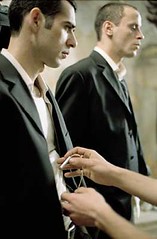Paradise Now
Starring: Kais Nashef, Ali Suliman, Lubna Azabal
Director: Hany Abu-Assad
 Post 9/11, almost every take on terrorism has fallen into two stereotypes: the extremists or the sympathisers. This is the first movie I’ve seen told from the viewpoint of the terrorists themselves.
Post 9/11, almost every take on terrorism has fallen into two stereotypes: the extremists or the sympathisers. This is the first movie I’ve seen told from the viewpoint of the terrorists themselves.
Paradise Now tells the story of the last 48 hours of two young Palestinian men, childhood friends Saïd (Kais Nashef) and Khaled (Ali Suliman). Working dead-end jobs as auto mechanics and barely keeping above the poverty line, the two are informed by a point man for an unnamed Palestinian organization who informs them they have been chosen for a suicide mission to carry out a strike in Tel Aviv. This isn’t 24, so there’s no race to stop them or webs of deceit to unravel. No big setback befalls the two, merely a mix-up in timing and a period of separation when the two are no longer there to reassure each other they’re doing the right thing.
It’s this simple examination of motives – both personal and political – that is the movie’s greatest achievement. No real analysis or conclusion. Just a pause so you can ask yourself “Is this really worth it?”
Hollywood’s grasp on political subjects has always been shaky, first with the Irish, and post 9/11 with the fast and loose interpretation of (invariably) Middle Eastern conflicts. But there’s no posturing here. Saïd and Khaled aren’t religious zealots who’ve been indoctrinated since childhood (Khaled has to read his martyr’s message from a script which he reads in stutters to a video camera).
The film’s clever bit is actually Suha (Lubna Azabal) whose romantic interest in Saïd is a neat way for her to want to stop him going through with the mission. She digs him, so she doesn’t want him to blow himself up so you can buy the stuff she says more easily then if she were some moral idealist with a ‘love all, serve all’ ideology.
The three ultimately represent the full range of viewpoints:
Suha, that there are other alternatives to violence.
Khaled, that uncertainty is not always weakness.
And Saïd, that we all want to believe our lives have some kind of purpose, particularly when we’re called on to give it up.
It’s a simple story in the end.
It’s not that the characters suddenly find morality or remorse.
Merely that everyone wants to live.
It’s all fine and good for someone to die for what he believes in.
Until that someone is you.






<< Home